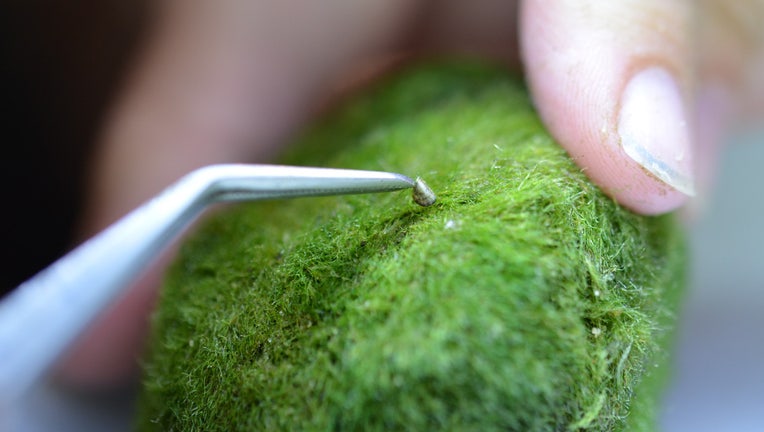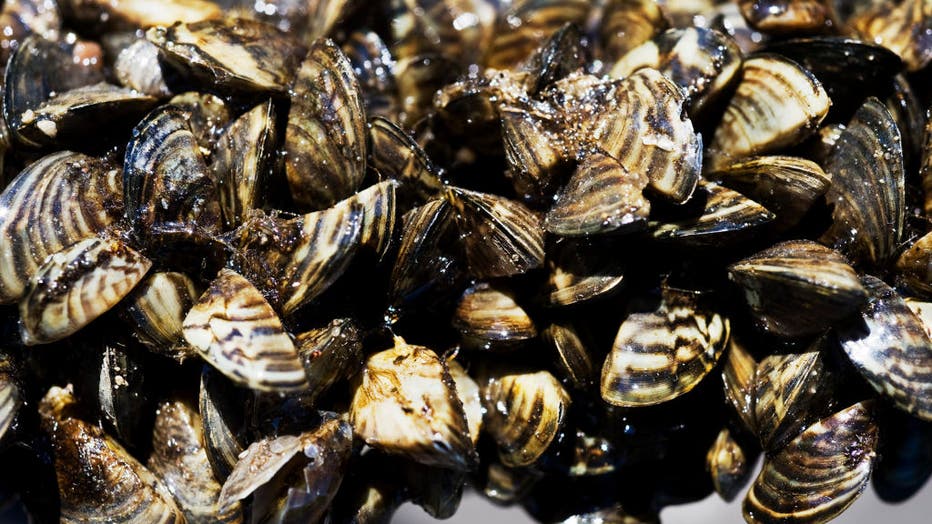Invasive species detected at aquarium wholesaler, alert issued in WA

Moss ball with invasive zebra mussel taken Aug. 12, 2024. (Photo: Washington Department of Fish and Wildlife)
RENTON, Wash. - Wildlife officials are asking pet stores in Washington and Idaho to be cautious after a highly invasive species was discovered hitching a ride on a popular aquarium item in Renton earlier this month.
According to the Washington State Department of Fish and Wildlife (WDFW), on Aug. 5, a local wholesale aquarium company in Renton notified wildlife officials after finding zebra mussels on a shipment of Marimo moss balls.

(Photo By David Brewster/Star Tribune via Getty Images)
Within minutes, a WDFW Aquatic Invasive Species team arrived, collected the moss balls in question, and was able to positively identify multiple adult zebra mussels.
In addition to pet stores, the WDFW is asking anyone who may have purchased Marimo moss balls for their aquariums to be on the lookout and report any sightings immediately.
"We all have a role to play in preventing and stopping invasive species, and the most basic action is to be aware and report anything that could be a problem and looks out of place. If you see something, say something, because you could find the first hitchhiker and prevent millions, if not billions, of impacts to the economy and environment," said Justin Bush, aquatic invasive species policy coordinator.
What are zebra mussels, and why are they invasive?
Zebra mussels are highly invasive mollusks that are native to waters in Eastern Europe and western Russia. They are invasive because they threaten native fish and wildlife the moment they are introduced to a new body of water. They have an extremely high reproductive rate. One individual female is capable of releasing up to one million eggs per year. Zebra mussels also cost taxpayers millions of dollars because they rapidly clog pipes and other intakes.
Zebra mussels were first detected on Marimo moss balls in retail pet stores in Seattle, Washington back in 2021. This quickly turned into an international response after zebra mussel-contaminated moss balls were detected in 41 other states and nine Canadian provinces.
Should I be worried about zebra mussels in Washington?
According to the WDFW, if zebra mussels become established and take hold in Washington, officials estimate it would cost more than $100 million each year to keep the state’s power and water facilities operational. That is in addition to the catastrophic damage zebra mussels can pose to native species and the environment.
"If you think your aquarium may be carrying invasive mussels, use the online reporting options including the Washington Invasives app or online reporting form," said Bush. "It is as easy as taking a photo and submitting for an expert to review."

Invasive beetle capable of wiping out ash trees spotted near WA
A small beetle with the capability of wiping out an entire species of trees has been spotted in the Pacific Northwest, and officials are warning the public to be on the lookout.
MORE NEWS FROM FOX SEATTLE
Exclusive: WA DCYF head responds to calls to step down after Green Hill School failures
Two retired WA ferries set sail for Ecuador, ending Puget Sound legacy
Marysville School District addressing budget after state's most 'alarming audit' in 17 years
Gorge Amphitheatre hit by thunderstorm, Bass Canyon day two canceled
Kayaker still missing after stormy weather in Everett, paddleboarders rescued
Mud, boulders delay reopening of WA's North Cascades Highway
'This can’t be happening': Father of 18-year-old murdered in Skagit County shares story
To get the best local news, weather and sports in Seattle for free, sign up for the daily FOX Seattle newsletter.

